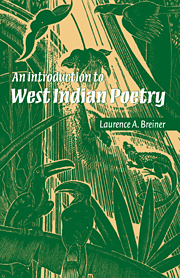Book contents
- Frontmatter
- Contents
- Preface
- Chronology for Anglophone Caribbean poetry
- Map of the Caribbean
- 1 West Indian poetry and its audience
- 2 The Caribbean neighborhood
- 3 Overview of West Indian literary histories
- 4 The relation to “Europe”
- 5 The relation to “Africa”
- 6 The relation to “America”
- Notes
- Guide to further reading
- Index
5 - The relation to “Africa”
Published online by Cambridge University Press: 06 January 2010
- Frontmatter
- Contents
- Preface
- Chronology for Anglophone Caribbean poetry
- Map of the Caribbean
- 1 West Indian poetry and its audience
- 2 The Caribbean neighborhood
- 3 Overview of West Indian literary histories
- 4 The relation to “Europe”
- 5 The relation to “Africa”
- 6 The relation to “America”
- Notes
- Guide to further reading
- Index
Summary
The real subject of this chapter is the specifically literary project of enabling actual West Indian people to be seen and heard in poetry, unimpeded by the filter of “Europe.” That long-term development of resources is to some extent overshadowed, however, by a particular episode along the way, the vigorous efflorescence of “Africa” (in various senses of that elusive word). This derives not from the dynamics of literary history but from exterior conditions. After World War II a variety of factors drew attention to Africa and increased actual knowledge of Africa. West Indian self-consciousness evolved within the wider context of American Black Power, transatlantic Negritude, African independence, and increasing British racialism (most pointedly legislated in the immigration restrictions of 1962). Awareness of this context was supplemented by reports of the cumulative experience of Caribbean migrants to the United States and England, and in a more limited way by reports of Caribbean visitors to Africa itself.
As both present-day Africa and its history came to be better known and more positively regarded, they played a potent psychological role for black West Indians. In the course of a development that traces its origins to the work of the Jamaican Marcus Garvey in the 1920s, a complex of ideas about Africa, some accurate and some fanciful, contributed to the West Indian self-image in several ways. It transformed attitudes toward race and color. It limned a history before slavery, thereby transforming the Middle Passage from a degraded point of origin to a traumatic but finite episode, on the other side of which a sophisticated culture could be discerned.
- Type
- Chapter
- Information
- An Introduction to West Indian Poetry , pp. 141 - 194Publisher: Cambridge University PressPrint publication year: 1998



